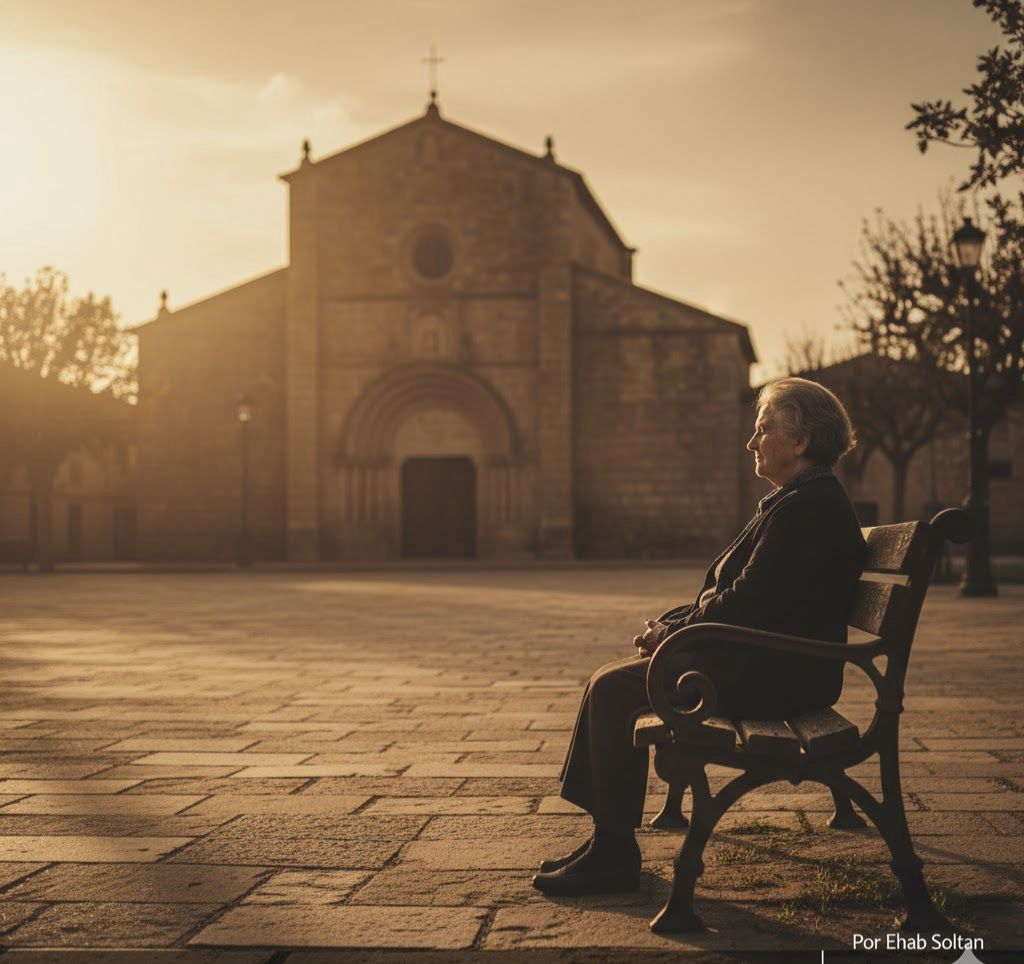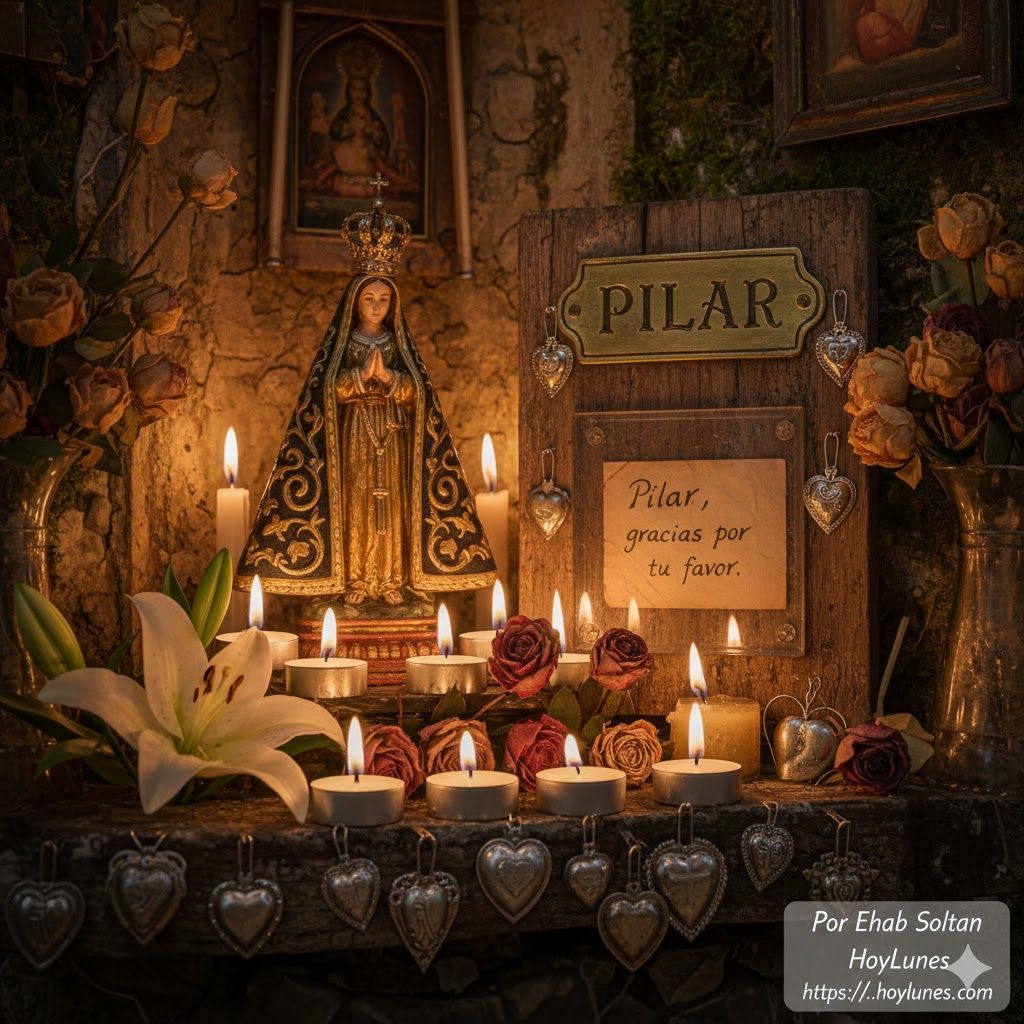A name that was once devotion, became tradition, and today bears the imprint of collective memory.
By Ehab Soltan
HoyLunes – There are names that sound like home; others, like church; some, like a novel. “Pilar” embodies that blend: it is devotion, custom, and presence. It is the name that has accompanied mothers, teachers, artists, and neighbors for decades in towns and cities across Spain. Between its gentle phonetics and its symbolic image lies a long, intimate, and collective story — that of a word which, like a pillar, supports family tales and local festivities.
The name “Pilar” comes from the Spanish Marian devotion to “Our Lady of the Pillar”, a patron saint especially venerated in Zaragoza. Etymologically, pilar derives from the Latin term pila or from the architectural element column — symbols of support and firmness. Thus, the name has long been associated with the idea of a column or support: the woman-pillar who sustains a home, a community, or a faith.
The symbolic dimension of the name makes Pilar both an image of refuge and of emotional authority: the one who accompanies, who guides, who endures. Within its religious root also lives a secular meaning — strength and stability amid personal and social changes.

Pilar is not a marginal name: it forms part of the catalogue of common names in the Spanish population, though its profile is generational — many Pilares belong to cohorts born in the first half and mid-20th century.
Historical evolution: Pilar was especially popular in 20th-century Spain, with peaks of frequency linked to periods of greater public religiosity. Today, it maintains demographic weight due to generational presence.
Variants and compounds: Pilar is used alone or in compounds (María Pilar), a traditional formula that emphasizes the Marian nature of the name and frequently appears in official records.
According to recent counts by the National Institute of Statistics (INE), the number of people named “Pilar” in Spain is around more than 120,000 bearers; journalistic reports analyzing INE data place the figure at about 129,000 Pilares in 2025, with a high average age — close to 66 years — highlighting its predominance among earlier generations.
The geographical distribution shows notable concentrations in certain provinces in the northeast and east of the peninsula: Zaragoza stands among the provinces with the highest absolute number of Pilares, and provinces in Aragon and other regions with strong local devotion appear with high relative frequencies. This connects clearly with the figure of the Virgin of the Pillar as a cultic and toponymic reference.
In Catalonia, for instance, demographic and census records also reflect the presence of the name Pilar in the historical population, though relative frequency varies between metropolitan and rural areas.

Recent trend: Although Pilar remains numerous in the total population, its use among newborns has declined; today’s lists of most popular names show a preference for shorter or more international options (Lucía, Martina, Sofía, etc.), indicating that Pilar is now a name more typical of earlier generations.
Zaragoza: due to the local devotion to the Virgin of the Pillar, the province concentrates a high number of Pilares in absolute terms. Regions with traditional roots — Aragon, Castilla-La Mancha, some areas of the Valencian Community and Andalusia — register a significant presence of the name among older populations.
In general, Pilar evokes small towns and villages more than urban centers with more globalized tendencies — though there are Pilares in every province: the name accompanies the entire map of Spain.
Demographic Profile and Curiosities
High average age: The average age of people named Pilar is high; this explains why Pilar appears so frequently in total population rankings, though it is less common among recent births.
Male cases: In historical and census records, there appear some men named Pilar (a minority practice linked to religious traditions or vows) — a curious and residual feature in name statistics.
Historical and Cultural Figures Who Bore the Name
Pilar has been the name of notable women in Spanish culture, politics, and society. Among the most recognized figures:
Pilar Miró — film director and a key figure in contemporary Spanish cinema.
Pilar Bardem — actress, activist, and a beloved figure in the theatrical and cinematic world.
Pilar Primo de Rivera — historically significant figure in 20th-century Spain (controversial for her political role).
Pilar Rahola — Catalan journalist and writer of public prominence.
Pilar Urbano — journalist and author, known for her works in popularization and essay.

M.ª Pilar Rueda Requena is one of those voices that connect theory and practice. Born in Valencia, her professional career is built between social work, teaching, and institutional management: she has presided over the Professional College of Valencia, trained in Political Marketing, and, through the Valencian Association for the Promotion of the Economy for the Common Good (AVEBC), has promoted projects for local transformation.
As a writer, M.ª Pilar is the author of “El Municipio del Bien Común” (The Municipality of the Common Good), a work that transcends the essay to become a narrative invitation to rethink urban coexistence: it tells, through the life of a family, how the five values of the model — human dignity, solidarity, social justice, ecological sustainability, and democratic participation — can become community practices. Her work combines technical insight and ethical commitment, placing her as a Valencian reference in the conversation about a fairer and more collaborative future.
These Pilares trace diverse paths — from artistic creation to public and political presence — showing the versatility of the name across different social spheres.
The Name in Culture and Festivities
October 12 — celebrated in Zaragoza as the feast of the Virgin of the Pillar — links the name to rituals, popular festivals, and pilgrimages. The toponym and the devotion have permeated toponymy (streets, schools, brotherhoods) and collective imagination; for this reason, Pilar sounds like pilgrimage, shop window, and regional celebration. This fusion between name and ritual is one of the reasons Pilar has been so frequent in Spain.
Recommendations for Curious Parents
If you are considering names with history and roots in Spanish tradition, Pilar offers meaning — strength — and cultural resonance. But it is also important to know that today it carries a marked generational profile: choosing Pilar means embracing continuity with previous generations and a family memory that can be both beautiful and affirming.
Pilar is a name that supports stories, rites, and memories. Within it coexist devotion and daily life, the public and the intimate. It maintains a firm presence across Spain’s map, and although its frequency among newborns has declined, its cultural footprint endures: every Pilar carries with her a piece of family and community history.
#hoylunes, #pilar, #nombres_con_historia, #ehabsoltan,



